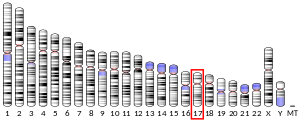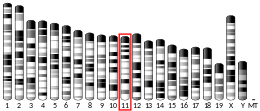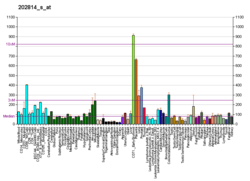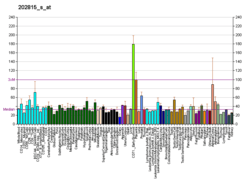HEXIM1
Protein HEXIM1 is a protein that in humans is encoded by the HEXIM1 gene.[5][6][7]
Interactions
HEXIM1 has been shown to interact with Cyclin T1[6] and Cdk9[8]
gollark: You can't do that. That would be stupid.
gollark: Fear.
gollark: Muahahaha. I am accessing Discord via my phone via my computer.
gollark: Fearsome.
gollark: I just realized that osmarkslisp™ never actually uses the `NoParse` thing I defined in it and apparently nobody noticed.
References
- GRCh38: Ensembl release 89: ENSG00000186834 - Ensembl, May 2017
- GRCm38: Ensembl release 89: ENSMUSG00000048878 - Ensembl, May 2017
- "Human PubMed Reference:". National Center for Biotechnology Information, U.S. National Library of Medicine.
- "Mouse PubMed Reference:". National Center for Biotechnology Information, U.S. National Library of Medicine.
- Huang F, Wagner M, Siddiqui MA (Jul 2002). "Structure, expression, and functional characterization of the mouse CLP-1 gene". Gene. 292 (1–2): 245–59. doi:10.1016/S0378-1119(02)00596-6. PMID 12119119.
- Michels AA, Nguyen VT, Fraldi A, Labas V, Edwards M, Bonnet F, Lania L, Bensaude O (Jun 2003). "MAQ1 and 7SK RNA Interact with CDK9/Cyclin T Complexes in a Transcription-Dependent Manner". Mol Cell Biol. 23 (14): 4859–69. doi:10.1128/MCB.23.14.4859-4869.2003. PMC 162212. PMID 12832472.
- "Entrez Gene: HEXIM1 hexamethylene bis-acetamide inducible 1".
- Kobbi L, Demey-Thomas E, Braye F, Proux F, Kolesnikova O, Vinh J, Poterszman A, Bensaude O (October 2016). "An evolutionary conserved Hexim1 peptide binds to the Cdk9 catalytic site to inhibit P-TEFb". Proc Natl Acad Sci U S A. 113 (45): 12721–6. doi:10.1073/pnas.1612331113. PMC 5111705. PMID 27791144.
Further reading
- Dias Neto E, Correa RG, Verjovski-Almeida S, Briones MR, Nagai MA, da Silva W, Zago MA, Bordin S, Costa FF, Goldman GH, Carvalho AF, Matsukuma A, Baia GS, Simpson DH, Brunstein A, de Oliveira PS, Bucher P, Jongeneel CV, O'Hare MJ, Soares F, Brentani RR, Reis LF, de Souza SJ, Simpson AJ (2000). "Shotgun sequencing of the human transcriptome with ORF expressed sequence tags". Proc. Natl. Acad. Sci. U.S.A. 97 (7): 3491–6. doi:10.1073/pnas.97.7.3491. PMC 16267. PMID 10737800.
- Ouchida R, Kusuhara M, Shimizu N, Hisada T, Makino Y, Morimoto C, Handa H, Ohsuzu F, Tanaka H (2003). "Suppression of NF-kappaB-dependent gene expression by a hexamethylene bisacetamide-inducible protein HEXIM1 in human vascular smooth muscle cells". Genes Cells. 8 (2): 95–107. doi:10.1046/j.1365-2443.2003.00618.x. PMID 12581153.
- Wittmann BM, Wang N, Montano MM (2003). "Identification of a novel inhibitor of breast cell growth that is down-regulated by estrogens and decreased in breast tumors". Cancer Res. 63 (16): 5151–8. PMID 12941847.
- Yik JH, Chen R, Nishimura R, Jennings JL, Link AJ, Zhou Q (2003). "Inhibition of P-TEFb (CDK9/Cyclin T) kinase and RNA polymerase II transcription by the coordinated actions of HEXIM1 and 7SK snRNA". Mol. Cell. 12 (4): 971–82. doi:10.1016/S1097-2765(03)00388-5. PMID 14580347.
- Paushkin SV, Patel M, Furia BS, Peltz SW, Trotta CR (2004). "Identification of a human endonuclease complex reveals a link between tRNA splicing and pre-mRNA 3' end formation". Cell. 117 (3): 311–21. doi:10.1016/S0092-8674(04)00342-3. PMID 15109492.
- Yik JH, Chen R, Pezda AC, Samford CS, Zhou Q (2004). "A Human Immunodeficiency Virus Type 1 Tat-Like Arginine-Rich RNA-Binding Domain Is Essential for HEXIM1 To Inhibit RNA Polymerase II Transcription through 7SK snRNA-Mediated Inactivation of P-TEFb". Mol. Cell. Biol. 24 (12): 5094–105. doi:10.1128/MCB.24.12.5094-5105.2004. PMC 419863. PMID 15169877.
- Michels AA, Fraldi A, Li Q, Adamson TE, Bonnet F, Nguyen VT, Sedore SC, Price JP, Price DH, Lania L, Bensaude O (2005). "Binding of the 7SK snRNA turns the HEXIM1 protein into a P-TEFb (CDK9/cyclin T) inhibitor". EMBO J. 23 (13): 2608–19. doi:10.1038/sj.emboj.7600275. PMC 449783. PMID 15201869.
- Yik JH, Chen R, Pezda AC, Zhou Q (2005). "Compensatory contributions of HEXIM1 and HEXIM2 in maintaining the balance of active and inactive positive transcription elongation factor b complexes for control of transcription". J. Biol. Chem. 280 (16): 16368–76. doi:10.1074/jbc.M500912200. PMID 15713661.
- Byers SA, Price JP, Cooper JJ, Li Q, Price DH (2005). "HEXIM2, a HEXIM1-related protein, regulates positive transcription elongation factor b through association with 7SK". J. Biol. Chem. 280 (16): 16360–7. doi:10.1074/jbc.M500424200. PMID 15713662.
- Schulte A, Czudnochowski N, Barboric M, Schönichen A, Blazek D, Peterlin BM, Geyer M (2005). "Identification of a cyclin T-binding domain in Hexim1 and biochemical analysis of its binding competition with HIV-1 Tat". J. Biol. Chem. 280 (26): 24968–77. doi:10.1074/jbc.M501431200. PMID 15855166.
- Wittmann BM, Fujinaga K, Deng H, Ogba N, Montano MM (2005). "The breast cell growth inhibitor, estrogen down regulated gene 1, modulates a novel functional interaction between estrogen receptor alpha and transcriptional elongation factor cyclin T1". Oncogene. 24 (36): 5576–88. doi:10.1038/sj.onc.1208728. PMID 15940264.
- Shimizu N, Ouchida R, Yoshikawa N, Hisada T, Watanabe H, Okamoto K, Kusuhara M, Handa H, Morimoto C, Tanaka H (2005). "HEXIM1 forms a transcriptionally abortive complex with glucocorticoid receptor without involving 7SK RNA and positive transcription elongation factor b". Proc. Natl. Acad. Sci. U.S.A. 102 (24): 8555–60. doi:10.1073/pnas.0409863102. PMC 1150813. PMID 15941832.
- Li Q, Price JP, Byers SA, Cheng D, Peng J, Price DH (2005). "Analysis of the large inactive P-TEFb complex indicates that it contains one 7SK molecule, a dimer of HEXIM1 or HEXIM2, and two P-TEFb molecules containing Cdk9 phosphorylated at threonine 186". J. Biol. Chem. 280 (31): 28819–26. doi:10.1074/jbc.M502712200. PMID 15965233.
- Fraldi A, Varrone F, Napolitano G, Michels AA, Majello B, Bensaude O, Lania L (2006). "Inhibition of Tat activity by the HEXIM1 protein". Retrovirology. 2: 42. doi:10.1186/1742-4690-2-42. PMC 1183248. PMID 15992410.
- Dulac C, Michels AA, Fraldi A, Bonnet F, Nguyen VT, Napolitano G, Lania L, Bensaude O (2005). "Transcription-dependent association of multiple positive transcription elongation factor units to a HEXIM multimer". J. Biol. Chem. 280 (34): 30619–29. doi:10.1074/jbc.M502471200. PMID 15994294.
- Rual JF, Venkatesan K, Hao T, Hirozane-Kishikawa T, Dricot A, Li N, Berriz GF, Gibbons FD, Dreze M, Ayivi-Guedehoussou N, Klitgord N, Simon C, Boxem M, Milstein S, Rosenberg J, Goldberg DS, Zhang LV, Wong SL, Franklin G, Li S, Albala JS, Lim J, Fraughton C, Llamosas E, Cevik S, Bex C, Lamesch P, Sikorski RS, Vandenhaute J, Zoghbi HY, Smolyar A, Bosak S, Sequerra R, Doucette-Stamm L, Cusick ME, Hill DE, Roth FP, Vidal M (2005). "Towards a proteome-scale map of the human protein-protein interaction network". Nature. 437 (7062): 1173–8. doi:10.1038/nature04209. PMID 16189514.
This article is issued from Wikipedia. The text is licensed under Creative Commons - Attribution - Sharealike. Additional terms may apply for the media files.





